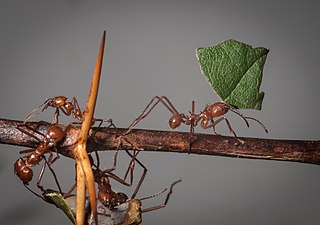
Ants are eusocial insects of the family Formicidae and, along with the related wasps and bees, belong to the order Hymenoptera. Ants evolved from vespoid wasp ancestors in the Cretaceous period. More than 13,800 of an estimated total of 22,000 species have been classified. They are easily identified by their geniculate (elbowed) antennae and the distinctive node-like structure that forms their slender waists.

Myrmicinae is a subfamily of ants, with about 140 extant genera; their distribution is cosmopolitan. The pupae lack cocoons. Some species retain a functional sting. The petioles of Myrmicinae consist of two nodes. The nests are permanent and in soil, rotting wood, under stones, or in trees.

The Sri Lankan relict ant is a species of ant placed in a tribe of its own within the family Formicidae. The genus is monotypic, with the only species endemic to Sri Lanka, where it is known from just a few locations. It is one of the few ant species considered endangered.

Plagiolepis is an ant genus of the formic acid-producing subfamily Formicinae. The genus is found in tropical and temperate regions of the Old World.

Crematogastrini is a tribe of myrmicine ants with 64 genera and 8 fossil genera.

Joseph Charles Bequaert was an American naturalist of Belgian origin, born 24 May 1886 in Torhout (Belgium) and died on 12 January 1982 in Amherst, Massachusetts.

Aneuretinae is a subfamily of ants consisting of a single extant species, Aneuretus simoni, and 9 fossil species. Earlier, the phylogenetic position of A. simoni was thought to be intermediate between primitive and advanced subfamilies of ants, but recent studies have shown it is the nearest living relative of subfamily Dolichoderinae.

Cataulacus is a genus of ants in the subfamily Myrmicinae. The genus is distributed in the Paleotropical regions, mainly in the Afrotropics. Most species are found in forests, but a few are known from more open and arid habitats.
Aphaenogaster avita is an extinct species of ant in the subfamily Myrmicinae known from a solitary early to middle Miocene fossil found in Japan. At the time of description A. praerelicta was one of twelve Aphaenogaster species to have been described from fossils and the only fossil species from Japan.
Malagidris is a Malagasy genus of ants in the subfamily Myrmicinae. Described in 2014, the genus contains six species.
Camponotus simoni is a species of carpenter ant. It is found from Sri Lanka.

Cataulacus granulatus, is a species of ant of the subfamily Myrmicinae, which is a widespread species that can be found from Borneo, China, India, Indonesia, Malaysia, Myanmar, Nepal, Thailand, Singapore, and Sri Lanka.
Cataulacus taprobanae is a species of ant of the subfamily Myrmicinae. It is a widespread species that can be found in Sri Lanka, India, and China.

Ants of Sri Lanka by R.K. Sriyani Dias is a zoology book about all the ant species in Sri Lanka. This is the first complete zoological book ever published in Sri Lanka after about 100 years, about ants. During the past decades, the taxonomic evidences about ants of Sri Lanka is full of doubts due to misidentification of various species and placement of them into various genera and subfamilies. At present, this book is the only publication about ants within Sri Lanka, which was published after Bingham's ant publication on 1903 on island.
Aneuretellus is an extinct genus of ant in the formicid subfamily Aneuretinae, and is one of eight genera of the subfamily. The genus contains a single described species Aneuretellus deformis and is known from one Middle Eocene fossil which was found in Sakhalin in the Russian Far East.
Leonardoxa africana is a tropical tree endemic to west-central Africa and southeastern Nigeria. It is divided into four sub-species, of which three are myrmecophytes.








